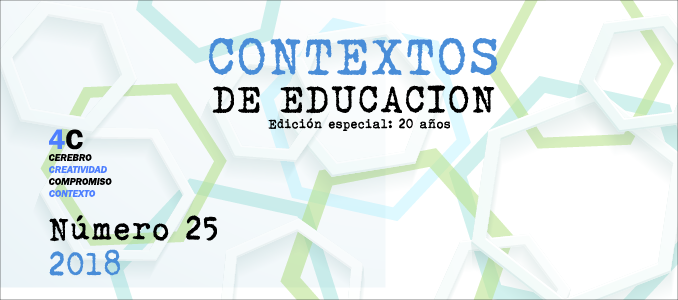EL MAESTRO COMO MODELADOR DEL CEREBRO. VAMOS DEL LABORATORIO AL AULA
Resumen
Se conoce que existen redes neuronales específicas responsables de capacidades básicas que están estrechamente relacionadas con el aprendizaje de las matemáticas y la lectura. Estas capacidades se observan muy temprano en los bebés y son parte del kit inicial para entender números o palabras escritas. Este hallazgo constituye un conocimiento usable derivado de la investigación con implicaciones importantes para la educación. Por una parte, apoya la estrategia de capitalizar esas capacidades durante la instrucción en el proceso de enseñanza y de aprendizaje siempre que sea posible. Por otra parte, usando herramientas teóricamente basadas, los maestros pueden ser muy susceptibles para detectar diferencias individuales en las trayectorias del desarrollo de dichas capacidades en los estudiantes. Con la práctica cotidiana, los maestros se convierten en agentes modeladores del cerebro de sus estudiantes por excelencia. En línea con este razonamiento, se fundamenta en este trabajo un programa basado en la escuela que se focaliza en el desarrollo de las capacidades neurocognitivas de los estudiantes.
Palabras Clave:
neurociencias
educación
aprendizaje
proceso neurocognitivo
políticas educativas
THE TEACHER AS A MODELER OF THE BRAIN. LET’S GO FROM THE LABORATORY TO CLASSROOM
Nowadays, there is robust evidence about the existence of specific brain networks responsible to basic capacities, which are close related with maths and reading learning. These capacities may function as part of the starter kit for understanding numbers or written words and they are conceived to be executed by domain-specific and genetically controlled system (Butterworth y Reigosa-Crespo, 2007). This finding constitutes a real usable knowledge derived from neuroscience´s research with important implications for education. On the one hand, it supports the strategy of capitalize on these neurocognitive capacities whenever possible during the instruction. On the other hand, using adequate tools, teachers could be very sensible to detect individual differences in the developmental trajectories of these capacities in the students. Teachers are among the best cognitive enhancer on the world, changing students’ brain on a daily basis to acquire literacy, numeracy, and reasoning skills. In line with this, appropriate school-based interventions focusing on a neurocognitive approach are promissory for enhancing the learning potential in typical and also atypical developing children.
Keywords:
neurosciences
education
learning
neurocognitive capacity
educational policy
Referencias
Butterworth, B., y Kovas, Y. (2013). Understanding Neurocognitive Developmental Disorders Can Improve Education for All. Science, 340(6130), 300-305. doi:10.1126/science.1231022
Butterworth, B., y Reigosa-Crespo, V. (2007). Information processing deficits in dyscalculia. In D. B. Berch y M. M. M. Mazzocco (Eds.), Why is math so hard for some children? The nature and origins of mathematical learning difficulties and disabilities (pp. 65-81): Baltimore, MD: Paul H. Brookes.
Butterworth, B., Varma, S., y Laurillard, D. (2011). Dyscalculia : From Brain to Education. Science, 332. doi:10.1126/science.1201536
Halberda, J., Mazzocco, M. M. M., y Feigenson, L. (2008). Individual differences in nonverbal number acuity predict maths achievement. Nature, 455, 665-668.
Transforming our world: the 2030 agenda for sustainable development, (2016).
OECD. The High Cost of Low Educational Performance: OECD Publishing.
Santos-Febles, E., Reigosa-Crespo, V., García-Liashenko, K., Echemendía, A., Plasencia, E., Pujols, G., y Eimil, E. (2015). A System to Support Regional Screening Programs to Identify School-age Children at Risk of Neurodevelopmental Disorders. 51, 1469-1473. doi:10.1007/978-3-319-19387-8_358
Spelke, E. S., y Kinzler, K. D. (2007). Core knowledge. Developmental Science, 10, 89-96. doi:10.1111/j.1467-7687.2007.00569.x
UNESCO-IBE. (2016). Intentional ICT: Curriculum, education and development. Retrieved from Geneva, Switzerland:
United Nations Educational, S. a. C. O. (2015). Education for all 2000-2015 : achievements and challenges. Paris UNESCO Publishing.
United Nations Educational, S. a. C. O. (2015). Rethinking Education. Towards a global common good? Paris: UNESCO.
United Nations Educational, S. a. C. O. (2016). Education for people and planet: Creating sustainable future for all. In.
Descargas
Publicado
Número
Sección
Licencia
Política propuesta para revistas que ofrecen acceso abierto
Aquellos autores/as que tengan publicaciones con esta revista, aceptan los términos siguientes:- Los autores/as conservarán sus derechos de autor y garantizarán a la revista el derecho de primera publicación de su obra, el cuál estará simultáneamente sujeto a la Licencia de reconocimiento de Creative Commons CC BY-NC-SA 2.5 AR que permite a terceros compartir la obra siempre que se indique su autor y su primera publicación esta revista.
- Los autores/as podrán adoptar otros acuerdos de licencia no exclusiva de distribución de la versión de la obra publicada (p. ej.: depositarla en un archivo telemático institucional o publicarla en un volumen monográfico) siempre que se indique la publicación inicial en esta revista.
- Se permite y recomienda a los autores/as difundir su obra a través de Internet (p. ej.: en archivos telemáticos institucionales o en su página web) antes y durante el proceso de envío, lo cual puede producir intercambios interesantes y aumentar las citas de la obra publicada. (Véase El efecto del acceso abierto).

